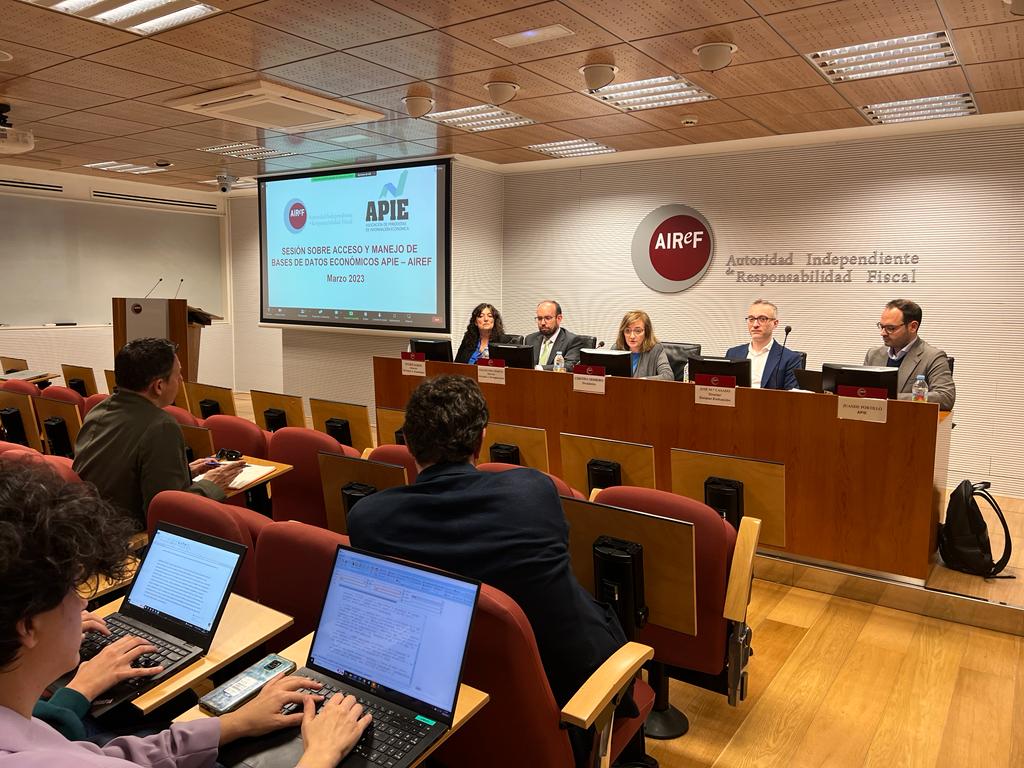
The president of the Independent Authority for Fiscal Responsibility (AIReF) today closed the workshop given by the Association of Economic Information Journalists (APIE) and AIReF on database access and management in which she reaffirmed AIReF’s commitment to information transparency and access to data. The workshop, organised at AIReF’s headquarters, was opened by the economic journalist Juande Portillo, a member of APIE, and was also attended by the directors of three of AIReF’s four divisions: Budget Analysis, Economic Analysis and Public Expenditure Assessment.
During the closing ceremony, Cristina Herrero considered it a great initiative to hold this type of workshop to promote analysis based on objective data, with transparency and rigour. This work, according to the president, also includes journalists, who have the enormous responsibility of reporting on complex economic matters. The president welcomed the fact that other institutions such as the Bank of Spain had taken part in these workshops and hoped that the initiative would be extended to other public bodies. “At AIReF we have always been committed to transparency, a guiding principle of our institution along with independence and accountability,” she said.
Despite the progress made in recent years, Cristina Herrero considered it necessary to raise the standard of transparency in the public sector. AIReF has promoted progress internally, demanding the highest standards of transparency from itself, and has opened up the debate on access to information in the public sector, where there are still major challenges to be met.
Internally, transparency has become an increasingly important part of the institution’s activity, expanding the information published on the website and the tools available to users. For example, all publications are accompanied by an Excel file with the data from the reports, graphs and tables and all the methodologies are published. AIReF also publishes its full economic and fiscal scenario, with medium-term forecasts, which it updates twice a year. It also carries out a self-assessment exercise of its forecasts.
AIReF has also developed tools that allow quick and easy access to large databases, such as the Regional and Local Government Observatories, the Observatory of assessment findings and proposals and the Observatory of the recommendations we make in the reports, currently under way. The institution has other tools such as the Debt Observatory, the MIPred real-time GDP forecast, the estimate by Autonomous Regions (Metcap), the conjuncture monitor and the stability target monitoring sheet.
The Long-term Sustainability Opinion is the best example of AIReF’s commitment to transparency. The Opinion itself has been published, a supporting Excel has been prepared and will be uploaded later this week, along with four supporting technical documents and an interactive Observatory in which different scenarios can be simulated.
Externally, AIReF, after almost ten years in existence, now has more or less guaranteed access to information, after a rough start when the institution was perceived as a threat. However, certain problems and areas for improvement are still detected. That is why AIReF published an Opinion on access to administrative data in October 2020 in which it called for a national strategy in this regard. At present, although progress has not been made fast enough on this strategy, there are important recent public initiatives. For example, AIReF has just signed an agreement with several entities for the transfer of data as part of the study on financial instruments to support internationalisation in the third phase of the Spending Review. AIReF has also resorted on numerous occasions to the signing of Memorandums of Understanding (MoUs), although it has not managed to sign MoUs with the Ministry of Economy or the Ministry of Finance, despite insistence. Neither have agreements been signed with the autonomous communities for the Minimum Income Scheme assessments.
The director of the Budget Analysis Division, Ignacio Fernández-Huertas, explained the use of fiscal databases and presented various AIReF tools, such as the Regional and Local Government Observatories and the stability target monitoring sheets. The director of the Public Expenditure Evaluation Division, José María Casado, presented the Observatory of evaluation findings and proposals, while the director of the Economic Analysis Division, Esther Gordo, explained the use of databases for economic analysis and forecasting and presented the institution’s long-term sustainability simulator.






